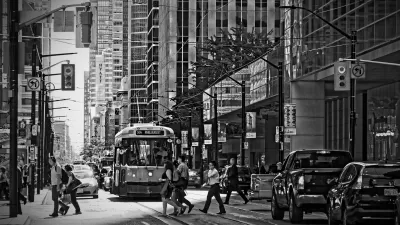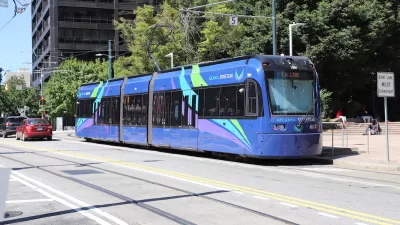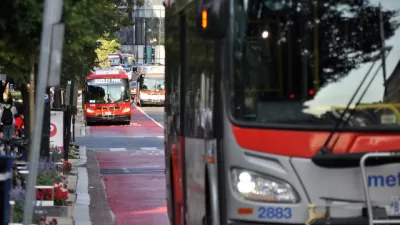After decades of big, expensive plans, diverting cars from a busy streetcar route will make a bigger difference to commuters for far less money.

One of Canada’s largest newspapers is urging transportation planners to stop thinking big.
From The Globe and Mail:
“In Canada's megalopolis, there is always some hulk of exceedingly expensive, allegedly transformational transit being pondered, pedalled or dreamt on. The problem is that these either never get built – or worse, they get built.”
Instead, the paper’s editorial board praises a one-year pilot project just put into place that “severely” restricts cars from a stretch of King Street that is also home to Toronto’s “busiest streetcar route.”
"The cost of this big change on one of the busiest transit routes in the city? Small. Instead of being measured in billions of dollars and decades of construction, it involved the exorbitant expense of trucking in a few concrete barriers, changing a handful of road signs and buying some yellow paint. Construction period? Counted in days. This in a city used to endlessly debating big, transformative transit solutions that, if they could get funded, would arrive around the time one of Jagmeet Singh's grandchildren is elected prime minister."
But there is one problem—unlike the big, expensive projects that aren’t getting built and don’t serve as many passengers, for this project, the “branding is all wrong.”
"Without big brand ambition, politicians won't be able to love the little miracle on King Street. So, first item of business? Stop calling it TTC route No. 504. Heck, stop calling it a streetcar. Rename it the Cross-Town Rapid Transit Way. The Super Fast Surface Service. The Toronto Hyperloop. The King Street Subway. Whatever."
So, the paper writes, even if the projects is small, please “[m]ake no little marketing plans.”
FULL STORY: Globe editorial: A little transit miracle grows on King Street

Planetizen Federal Action Tracker
A weekly monitor of how Trump’s orders and actions are impacting planners and planning in America.

Maui's Vacation Rental Debate Turns Ugly
Verbal attacks, misinformation campaigns and fistfights plague a high-stakes debate to convert thousands of vacation rentals into long-term housing.

Restaurant Patios Were a Pandemic Win — Why Were They so Hard to Keep?
Social distancing requirements and changes in travel patterns prompted cities to pilot new uses for street and sidewalk space. Then it got complicated.

In California Battle of Housing vs. Environment, Housing Just Won
A new state law significantly limits the power of CEQA, an environmental review law that served as a powerful tool for blocking new development.

Boulder Eliminates Parking Minimums Citywide
Officials estimate the cost of building a single underground parking space at up to $100,000.

Orange County, Florida Adopts Largest US “Sprawl Repair” Code
The ‘Orange Code’ seeks to rectify decades of sprawl-inducing, car-oriented development.
Urban Design for Planners 1: Software Tools
This six-course series explores essential urban design concepts using open source software and equips planners with the tools they need to participate fully in the urban design process.
Planning for Universal Design
Learn the tools for implementing Universal Design in planning regulations.
Heyer Gruel & Associates PA
JM Goldson LLC
Custer County Colorado
City of Camden Redevelopment Agency
City of Astoria
Transportation Research & Education Center (TREC) at Portland State University
Jefferson Parish Government
Camden Redevelopment Agency
City of Claremont





























